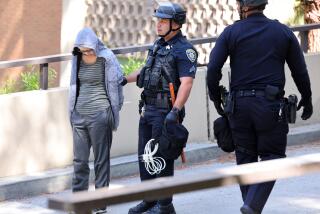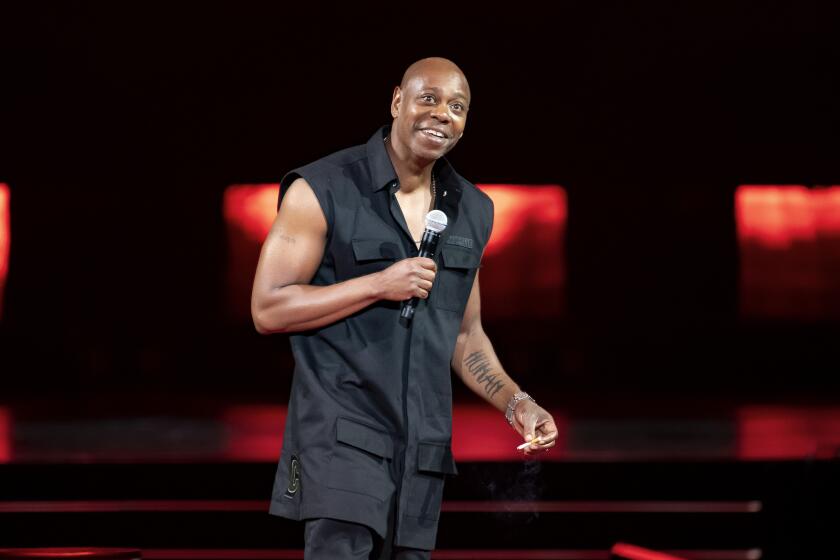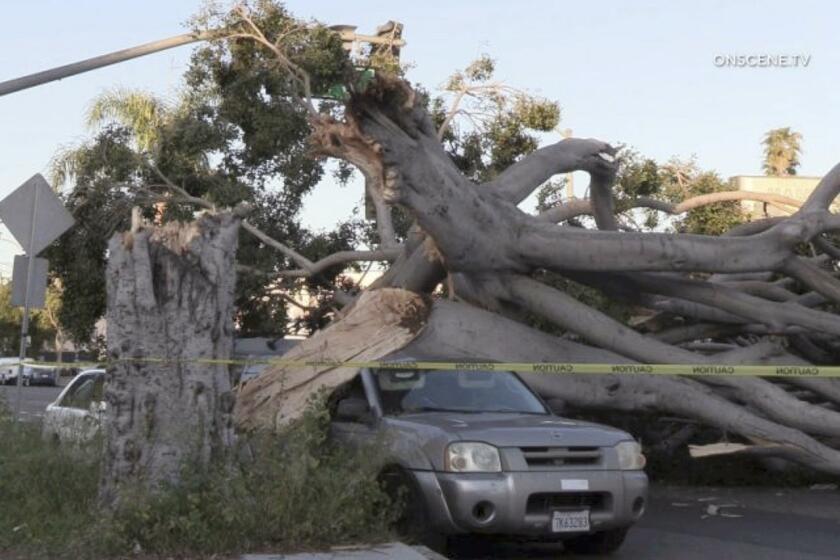Police Beating Case Puts Hahn in the Middle
In the two days since a Los Angeles police officer was videotaped beating a suspected car thief with a flashlight, Mayor James K. Hahn has repeatedly described the city’s response to the inflammatory incident as a test.
“The community is watching,” he said on the steps of a police station hours after the African American man was arrested. “They are going to hold us accountable.”
With Hahn heading into a tough campaign for reelection next March against several formidable opponents, that test could prove most critical for him.
The mayor faces the challenge of avoiding a repeat of the last decade’s disasters, when city leaders split over the 1991 videotaped beating of Rodney G. King and failed to defuse resentment in the black community that erupted into riots.
But as Hahn negotiates the kind of crisis that has ruined political reputations, he risks alienating some of his strongest supporters.
If he does not sufficiently condemn the videotaped beating, he may further anger many in the black community who voted for him but are still upset by his decision to fire former Police Chief Bernard C. Parks. But if the mayor is too critical of the police, he could lose the backing of officers whose union played a central role in his 2001 election.
“When incidents like this happen, elected officials, especially the mayor, need to step forward and lead,” said Kerman Maddox, a veteran Los Angeles political strategist who is working to reduce violence in the city’s African American community. “That’s important for the city. But it’s also important for Hahn’s political future.”
In the two days since two television news helicopters captured the beating early Wednesday morning, Hahn has very publicly put his administration and the Police Department that he oversees on the line.
“We’re a community that unfortunately has been rocked by incidents involving [the] LAPD. We’ve climbed out of a trench of disaffection and distrust,” the mayor said at a Thursday news conference in front of Parker Center, the police headquarters downtown. “We need to demonstrate to the community that their trust in us is not misplaced.”
Along with African American leaders and Chief William J. Bratton, the mayor has consistently condemned the conduct seen in the video of Wednesday’s incident. And he has urged the Police Department to conduct a thorough and swift investigation of the eight officers who apprehended Stanley Miller, a 36-year-old black man who was driving a stolen car.
“We will not tolerate unlawful excessive force from any member of the Police Department,” Hahn said, speaking without the notes he often reads at public events.
Videotape of the arrest showed one of the officers striking the suspect with a flashlight 11 times after it appeared that the man had surrendered. None of the other officers seemed to intervene. Bratton identified the officer as John Hatfield, a 35-year-old Latino.
The united and forceful response by city leaders marks a dramatic change from the deep fissures that emerged after the King beating. Then-Mayor Tom Bradley and Police Chief Daryl F. Gates were not even on speaking terms at the time.
Leaders’ response to this week’s beating drew praise from key figures in the city’s African American community and local elected officials.
“The mistake in Rodney King was that the man on the street did not hear enough outrage,” said county Supervisor Zev Yaroslavsky, who served on the Los Angeles City Council from 1975 to 1994 and was close to Bradley.
Yaroslavsky applauded Hahn’s decision to explicitly condemn the police conduct.
Other community leaders said the mayor and the police were also benefiting from significant changes in Los Angeles in the years since King, an African American, was beaten by white police officers after a high-speed chase. Four officers were tried in Superior Court, and their acquittal in 1992 touched off three days of riots.
“One thing this mayor has going for him is that the level of anger and frustration with the police does not seem to be as high as it was in 1991,” said former Councilwoman Rita Walters, who represented part of the area most devastated by the riots.
But for a mayor who has struggled to build relationships with other city leaders, with the city’s diverse communities and with the police rank and file, the tests ahead remain immense.
“The mayor already faces some big-time challenges in the black community,” said John Mack, president of the Los Angeles Urban League. “There are some unhealed wounds.”
Hahn owes his election three years ago in large part to African Americans, who accounted for 40% of his support at the ballot box in the mayoral primary and 26% in the runoff, according to exit polling conducted by The Times.
But Hahn’s decision two years ago to remove Parks, the city’s second African American police chief, enraged many black people and may have contributed to Parks’ decision to challenge Hahn in next year’s mayoral election.
Several black leaders said the mayor had been saying the right things. But Mack said he and others were still watching closely. “The mayor’s credibility is tied very closely to the outcome of this investigation,” Mack said. “It’s very, very important that the investigations under the control of the city be fast-tracked ... and the mayor can play a key role in that. He can really insist that there be no whitewash, that nothing is swept under the rug.”
However, Hahn’s strong condemnation of the beating is already proving troublesome for his relationship with rank-and-file police officers.
In the 2001 mayoral campaign, the Los Angeles Police Protective League spent $32,500 to support Hahn and gave him an early endorsement, allowing the former city attorney to campaign as the law-and-order candidate.
“The value of that endorsement is substantial in a city where people are more concerned about crime than just about anything else,” said Republican strategist Arnold Steinberg, who worked on Richard Riordan’s successful mayoral campaigns in 1993 and 1997.
The police union issued a short statement Thursday simply urging community leaders and elected officials “not to rush to public judgment” in the case.
But a spokesman said many officers had complained to the league about statements by elected officials -- such as the mayor -- that labeled the officers’ conduct as excessive force.
It was complaints by police union members that helped end Parks’ career as police chief.
Times staff writer Jeffrey L. Rabin contributed to this report.
More to Read
Start your day right
Sign up for Essential California for news, features and recommendations from the L.A. Times and beyond in your inbox six days a week.
You may occasionally receive promotional content from the Los Angeles Times.






